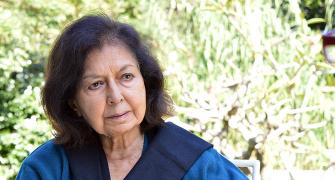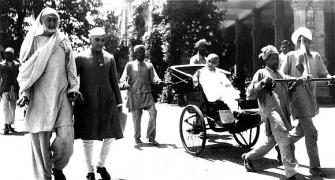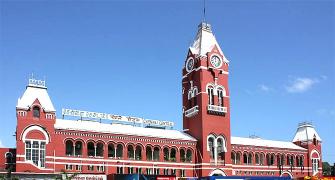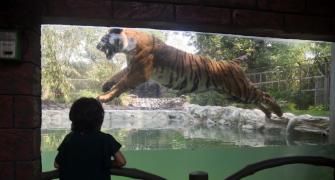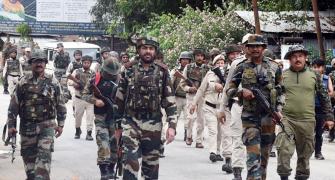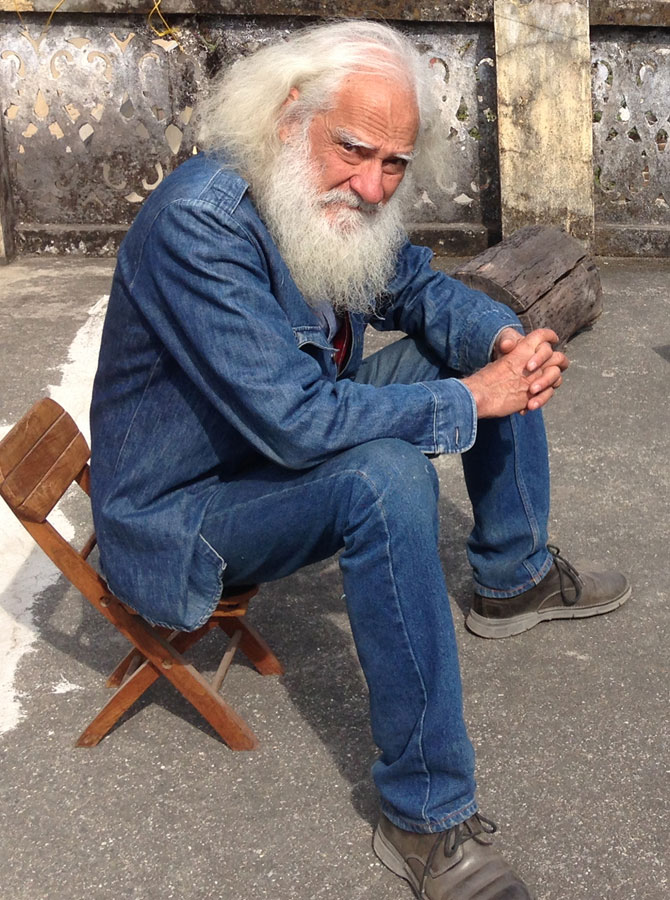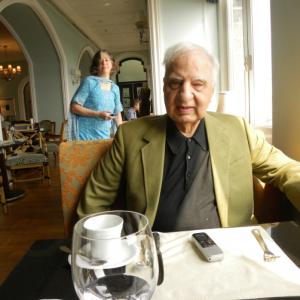'... A youth movement which could really transform our politics in a way that the existing elites don't understand.'
'The State can't suppress a young society like India where there are so many interesting new ideas emerging,' says Sunil Khilnani, whose latest book Incarnations looks at Indian history through 50 lives.
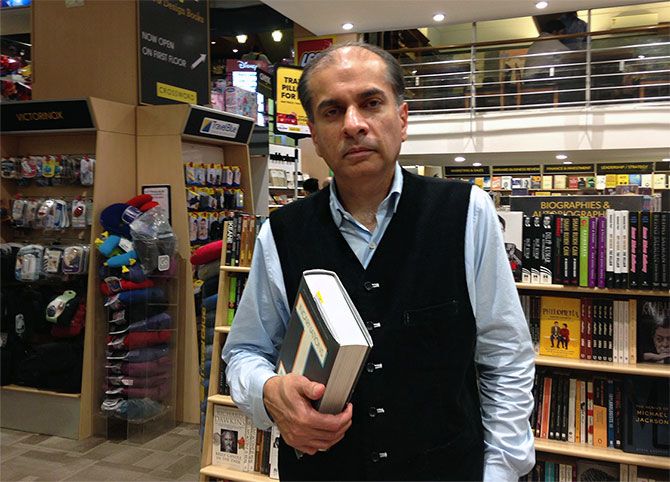
Sunil Khilnani is standing in front of the new arrivals at Mumbai's Crossword book store in Kemps Corner, surrounded by a clutch of young book store staffers.
"This book is about 50 Indians. You can read one every night before you go to bed," says the historian about Incarnations, an extremely readable book about the people who have shaped 2,500 years of Indian history.
The stories look at these individuals -- some famously known like Buddha, Ashoka, Gandhi, Raj Kapoor; and others forgotten like Malik Ambar, William Jones, Nainsukh -- as human beings, and not as some distant figures from the past.
Director of the India Institute at King's College, London, Professor Khilnani spent nearly two-and-a-half years researching the book and tries neither to debunk nor mythologise, but looks at these figures as real people.
In a conversation with Archana Masih/Rediff.com, he speaks about why history is the lifeblood of democracy, how the Idea of India is about allowing many Ideas of India and who among the 50 he would invite to dinner.
I was reading your book on a flight and a young man looking forward to buying his own copy told me that most of our history is written by the Marxists. What would you say to this young man?
Unfortunately, the history that gets told is much too skewed by or shaped by ideological stories, so whether it is the Left Marxists or the Right Hindutva, or the Congress -- everyone has their own political spins.
This toxifies history. It becomes very difficult to know what to trust, why people are telling the stories they are and what their interests are. We as citizens must step back from those ideological histories and ask some clear and sceptical questions.
One way of doing that is by looking at these figures from the past as human beings, not as vehicles of ideology or a particular political interest.
In my book I've tried to de-mytholgise them. That doesn't mean I am trying to be iconoclastic. I am neither trying to debunk nor mythologise, but to look at them as real people. It then becomes much harder by one party or one group to capture them.
So your travel colleague was pointing to something real. We should be bringing more figures into the understanding of the Indian past. This book has 50, but that's not the end, let's have more.
Why is engagement with history so important for the kind of nation we want to be?
It's a question very dear to my heart. History is not a luxury or indulgence or dwelling in a nostalgic past. By looking at history we can both learn how we have done some things well and also why we continue to do some things so badly.
History is the lifeblood of a democracy. It is a lesson book for our successes and failures.
It is even more important for us because we are a democracy. In a democracy all of you have in a sense is the previous historical experience of your society.
You look at the other great democracies of the world -- the USA or Britain -- they are deeply engaged with their histories.
In America -- there are hundreds of books with different interpretations of George Washington or Abraham Lincoln. Why is that? Because they see these figures as being critical to America's present and to its future.
Similarly, we should have hundreds of books whether on Patel, Ambedkar and others. History is not a luxury, but a necessity for a society like ours.
You mention Patel. You have also said it was brutal coming down to just 50 names for your book. Why did you not include Patel?
I left out many. Through the figures I chose, I wanted to tell the whole story of India, but also address some of the fundamental conflicts and contradictions in our society -- like caste, gender, freedom of expression, religious bigotry.
That was the criteria for choosing these lives. I could have just so many from the 20th century because I cover two-and-a-half thousand years.
There is also nobody from the North-East that features in the book.
That's a big question and I am very aware of that. I did debate that a lot and would have wanted someone very much from the North-East, but I found primary sources very hard to find.
All the essays in this book are based on documents, on real historical data and not second hand stuff.
I thought about including (Naga leader Angami Zapu) Phizo from the 20th century, but I would have had to lose another figure.
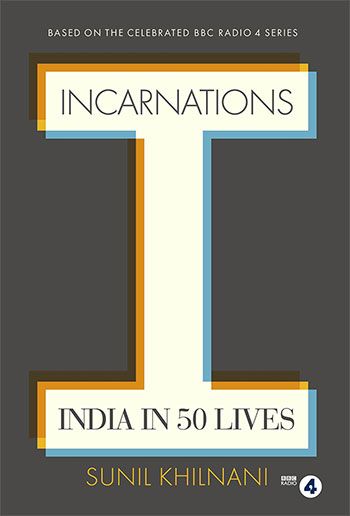
This book comes nearly 20 years after your previous book The Idea of India. What are the new ideas that have come to populate India in these 20 years?
In many ways I still think that the ideas I made in that book still hold up.
One element that I would emphasise much more today is the aspect of inequality which has become even greater now. When I wrote that book we were at the beginning of the growth process.
The two aspects I would add are domestic inequalities and our location in a much more volatile international domain.
In the early 2000s people were saying that the world wants India to succeed as Dr Manmohan Singh used to say in his speeches. That is not true today.
I think the world now is turning away from globalisation and is becoming more protectionist. European and other countries are becoming more nationalist.
The world is not as much welcoming about India's success. We have to make our own way in the world under a situation where there are intense internal pressures.
The complexities that the Idea of India has to deal with today are greater than 20 years ago. But that's not a reason to be pessimistic because the Idea of India itself as I describe was born in very difficult circumstances in the 1940s-1950s -- Partition, an uncertain global sphere, and a much weaker society.
The difficulties that we face can be a way to find powerful solutions through political judgment.
The Idea of India contained in your last book is one of pluralism and inclusiveness, which is currently being debated on almost a daily basis. Is that idea under any kind of threat?
I wouldn't say it is under threat, but this conception has always been part of an argument.
It has always been under challenge going back to the late 19th century. You had the argument between those who wanted a more exclusive definition of the nation and those who had a better understanding of Indian history.
Those who saw that we were going to have an Indian nation which had to be more open, more recognising of the plurality and acknowledged that the idea of India had to allow many ideas of India.
We've always had that tension right through the 20th century; we had it in the 1990s and we have it again today.
It is more part of the democratic debate and it has to be kept within the civil and Constitutional frame. The danger is when it becomes aggressive, violent and destroys the principles of our Constitution.
People have to argue back and have the better argument about Indian history and thought. I hope my book will give people the material to see that given our history, the Idea of India that I describe in my earlier book, is the one that is best able to respect our history and also to take us forward.
Dangers arise when a narrow, belligerent, nationalism advocates only a certain kind of nationalism to be the 'right one.' Why do you think that is the case?
There are these arguments in many countries. People have different conceptions of what a nation is.
In America and Britain you have these arguments about migrations, immigrants and who is the real nation -- that is part of the diversity of political views.
We in India have to be particularly sensitive to the dangers of that argument -- the more exclusive nationalism, the kind I call the 19th century European provincial nationalism -- one nation, one culture, one language, one religion, one race.
We need to be more careful because so many countries in our neighbourhood have tried to follow a more exclusive nationalism and look where they are.
Look at how Sri Lanka almost destroyed itself. Look at what's happened in Pakistan. It represents a 19th century view of nationalism that many in India today with a different religion also subscribe too.
The Hindutva version is a sort of mirror image of the one nation ideology that created Pakistan. We need to be aware that this is very intimately related to ourselves. That's why it has urgency and importance for us.
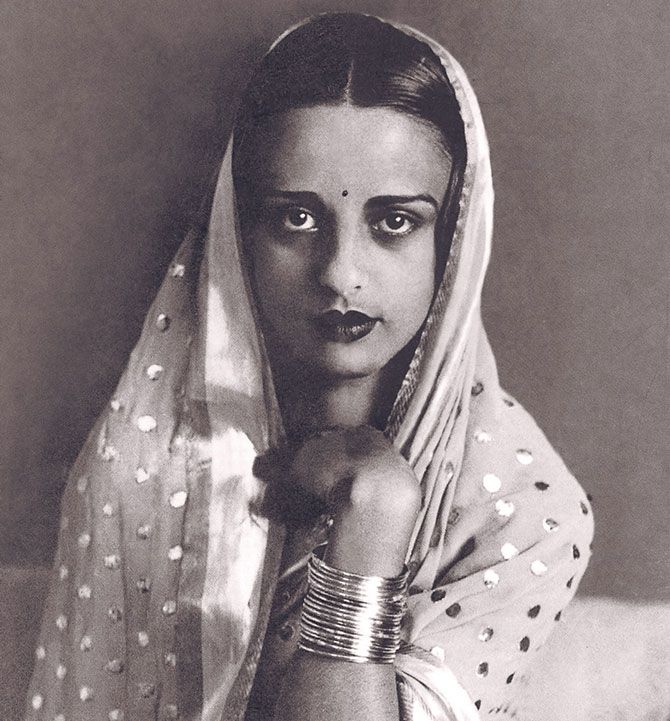
You say in the present situation, the exile of M F Husain may have been a lucky fate because some writers and intellectuals are being murdered for their beliefs -- it paints a very grim picture of our society.
When I say he was lucky, I say that ironically.
In many ways it is a disastrous picture. In an open society, artists, writers, painters or photographers are the people who have to be entitled to say what they want. Obviously there are bounds and we have to show our commitment to the basic principles of freedom of expression.
What did the national movement fight for? It fought for freedom of expression and ideas. If we can't uphold that today, it's a very serious disruption of the freedoms that our founders fought for.
This goes back to democratic societies -- it is only through the free exchange of ideas and the debate between ideas that the truth emerges. It's a way in which we as a society discover what is good and bad, what's right and wrong -- and some of these ideas may also offend.
Living in a democracy is being willing to be offended.
What long term effect can the insistence on homogeneous thinking have on Indian thought?
If you look at history, any time you try to suppress thought and freedom of ideas, the ideas and freedoms come back. Whether it was the Inquisition in the Christian Period, the despotic rulers in other parts of the world, or the Colonial Period.
The more you suppress free expression, the more people will value it.
The State can't constrain and suppress especially a young society like India where there are so many interesting new ideas emerging -- and the State shouldn't even try to control it.
It's some sort of desperate losing battle that some people are trying to fight.
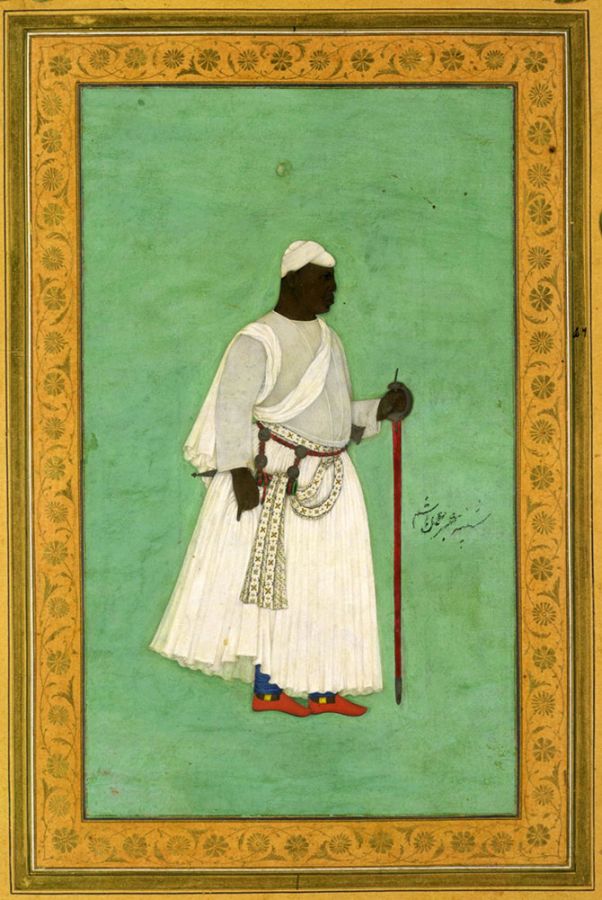
Like you mention that a civilization able to produce Mahavira, Mirabai, Gandhi, Jinnah, Iqbal, Periyar, Bose, Malik Ambar is open to radical experiments and has room for all sorts of rebel rousers?
Exactly! And that's precisely what I want us to see. You look at the range of people from Guru Nanak to Mahavira -- they were all in their 20s and 30s -- fighting against society.
Amrita Sher-Gil, Mirabai... these were angry young people who did not conform. That's the strength of our history. That's the kind of spirit that I hope people will read this book with.
These people speak to me. They are not from the distant past. They should be present and we should be arguing and taking inspiration from them today.
Do you ever feel that space is shrinking today?
I don't think so. Sometimes it looks like it and there are real challenges, and one of those is the challenge to universities as a free space.
For me an absolute fundamental principle of a university is that it should be a republic of ideas -- a free space where the state does not interfere.
A university is where you can think the unthinkable and say the unsayable. It is the one space in society where one can do that. There is a very deep danger if you start to interfere and dilute that principle.
All the great universities were created with that fundamental principle. They are places where only ideas and truth prevail, not power. There is pressure today on that idea of the university.
On the other hand, as this pressure is exerted, people will fight back. I think we are possibly on the verge of a student movement, a youth movement which could really transform our politics in a way that the existing elites don't understand. I think we need to watch this space.
If you look at our history those moments that have looked the bleakest often generate the most interesting outcomes.
In my essay on Indira Gandhi, I talk about how she was a very disliked figure in the Emergency and yet the Emergency produced a reaction which reaffirmed and strengthened democracy.
In that sense I remain extremely optimistic and hopeful because if I look at the experience of our past, young people can take us in directions we can't even imagine yet.
Do you think we really should be debating about who is a patriot and who is a traitor after having been a nation State for 70 odd years?
I don't. The idea that we can reduce these subjects to slogans; or to what we eat, has no bearing on what true patriotism is.
We should be talking about patriotism more than nationalism. For Tagore, Gandhi and others in the 20th century, patriotism was not about a slogan or what you eat or how you dress, it was about what you feel.
It's about the fellow feeling we have as citizens and part of that fellow feeling is respecting each other to be different. To have different views, to dress and eat and live differently -- that is the core definition of patriotism.
The other would be the sense that we can always be greater than what we are today. That we can always do better. If we have that view -- which is a patriotic view -- we are always going to be self critical.
Currently it is not even a debate, but a slanging match, a self interested distraction by political groups.
Leaders especially in the freedom movement did a lot of personal writing. Gandhi, Nehru, Ambedkar -- they wrote letters, essays. The leaders of today do not personally write as much -- how will this affect the telling of history?
It is going to leave future historians a problem about sources because what we have in the 20th century are these amazing collection of letters, diaries and writings.
Maybe 100 years from now the historian will have to go through thousands of tweets or blog posts which are very public. Increasingly public figures don't express their private thoughts.
The other aspect is that so many of these early figures were so reflective about what they did. They were not just actors, they also thought about what they did and wrote about it. They were self conscious and pondering which today's politicians are not, they simply want to see themselves reflected in their supporters.
The essay on Krishnadevaraya shows that he thinks about the paradoxes of power in the early 16th century in Vijayanagar. Here's a man who was a very powerful ruler, a very violent figure and at the same time was deeply reflective about what it meant to be king and that reflection is very deep in our tradition.
We saw this in our 20th century leaders and it is a valuable asset that we should remind our leaders of today.
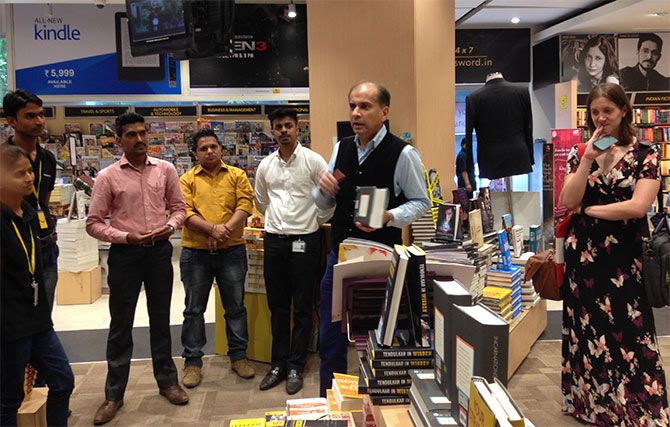
Many Indians feel they have been done in by history. Do you feel there needs to be a rectification to include more historical figures? What kind of process would this rectification be?
We need to radically think how we bring history to ourselves and the younger generation. This book is very much about telling a serious history in a way that can engage and interest a broad readership. There are ways to make accurate history more accessible to people.
How we get this into text books is a complicated issue because text books are battle grounds -- different states, governments -- want to push a certain kind of story which often it is a fairy story about an ideological position.
The only real way to push back against that is to be sceptical of those text books and say let's look at the real history. Don't give us text books where the Mughals or the Dalits don't appear or only one or the other appear -- that's not history, those are lies.
It seems very far fetched, but is there a possibility that the Mughals will not exist in history books?
The Soviets tried to exclude some things, the Chinese Communists tried to do that. Totalitarian impulses try to do that, but you can't erase history so easily.
I won't be easily optimistic, that's why I say it's a battle, a real battle but provided we fight it with knowledge and a sense of truth behind it, I don't think it will be possible.
In this group of 50, who do you think have been wrongly judged by history?
Many of them. Krishna Menon, Chidambaram Pillai, Periyar, Malik Ambar .. these are figures that I wanted to bring back because even our forgetting tells us something. Not just how we remember, but how we forget is also revealing.
Who among the 50 would you like to invite to dinner?
Buddha, Malik Ambar, Amrita Sher-Gil, Dhirubai Ambani, William Jones.

